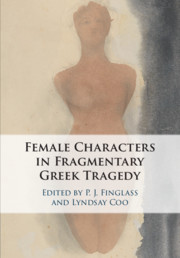Book contents
- Female Characters in Fragmentary Greek Tragedy
- Female Characters in Fragmentary Greek Tragedy
- Copyright page
- Contents
- Notes on Contributors
- Preface
- Abbreviations
- 1 Introduction
- Part I Themes
- 2 Female Violence towards Women and Girls in Greek Tragedy
- 3 Greek Tragedy and the Theatre of Sisterhood
- 4 Women in Love in the Fragmentary Plays of Sophocles
- 5 Heterosexual Bonding in the Fragments of Euripides
- 6 Suffering in Silence
- Part II Plays
- Bibliography
- General Index
- Index of main female characters discussed
6 - Suffering in Silence
Victims of Rape on the Tragic Stage
from Part I - Themes
Published online by Cambridge University Press: 11 June 2020
- Female Characters in Fragmentary Greek Tragedy
- Female Characters in Fragmentary Greek Tragedy
- Copyright page
- Contents
- Notes on Contributors
- Preface
- Abbreviations
- 1 Introduction
- Part I Themes
- 2 Female Violence towards Women and Girls in Greek Tragedy
- 3 Greek Tragedy and the Theatre of Sisterhood
- 4 Women in Love in the Fragmentary Plays of Sophocles
- 5 Heterosexual Bonding in the Fragments of Euripides
- 6 Suffering in Silence
- Part II Plays
- Bibliography
- General Index
- Index of main female characters discussed
Summary
This chapter focuses on women who have themselves been the object of violence and who are linked by the theme of silence. The episode in Trachiniae in which Deianira is struck by the appearance of Iole has long been compared to the scene between Clytemnestra and Cassandra in Aeschylus’ Agamemnon: in both cases, a silent woman, a target of male sexual lust, arrives at the home of her new master and is met by his wife. The chapter highlights the relevance of a third play for this pattern: Sophocles’ Tereus, in which the mutilated Philomela, her tongue cut out, will have arrived at the palace of Tereus and his wife, her sister Procne. The chapter draws out the structural and thematic parallels between these three tragedies, showing how each offers a related but distinct configuration of the connection between female voice and voicelessness, suffering, and power.
Keywords
- Type
- Chapter
- Information
- Female Characters in Fragmentary Greek Tragedy , pp. 87 - 102Publisher: Cambridge University PressPrint publication year: 2020
- 4
- Cited by

